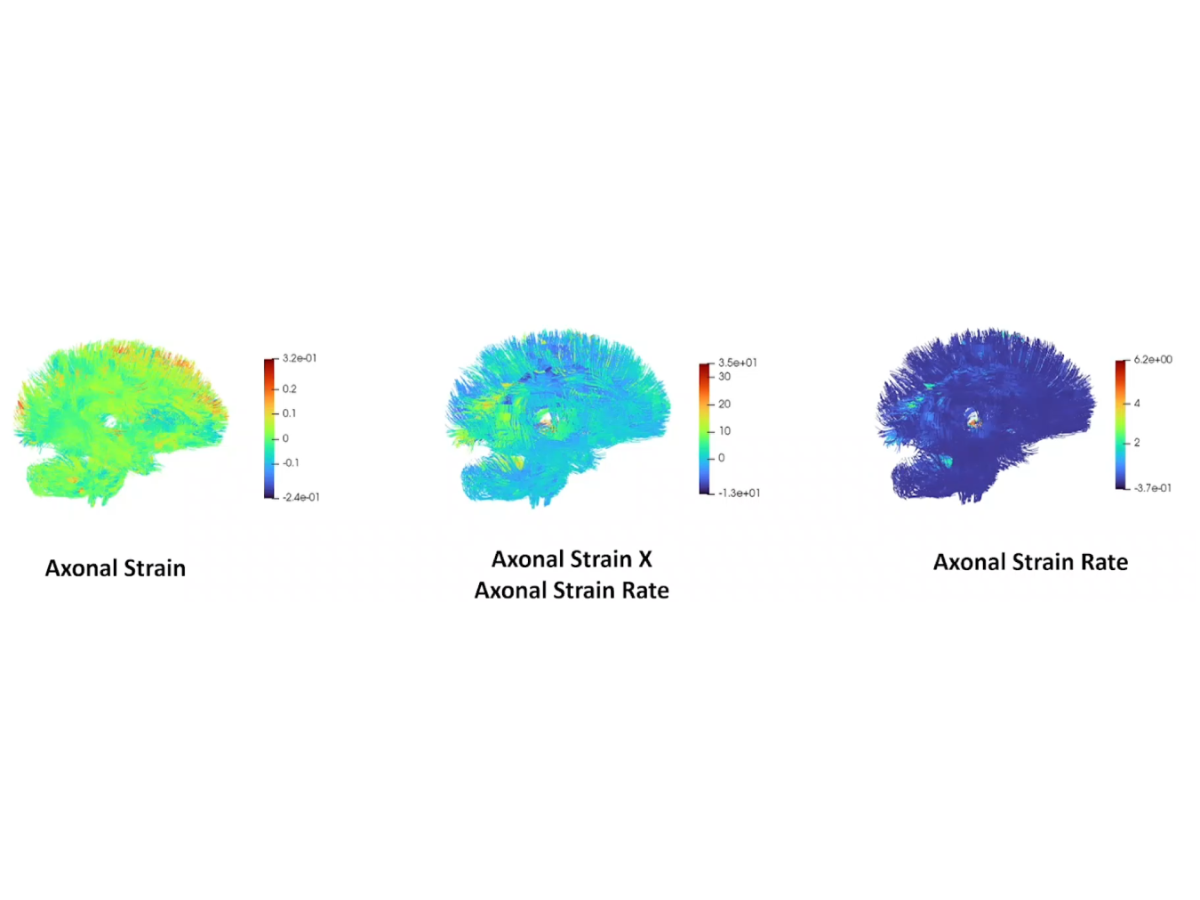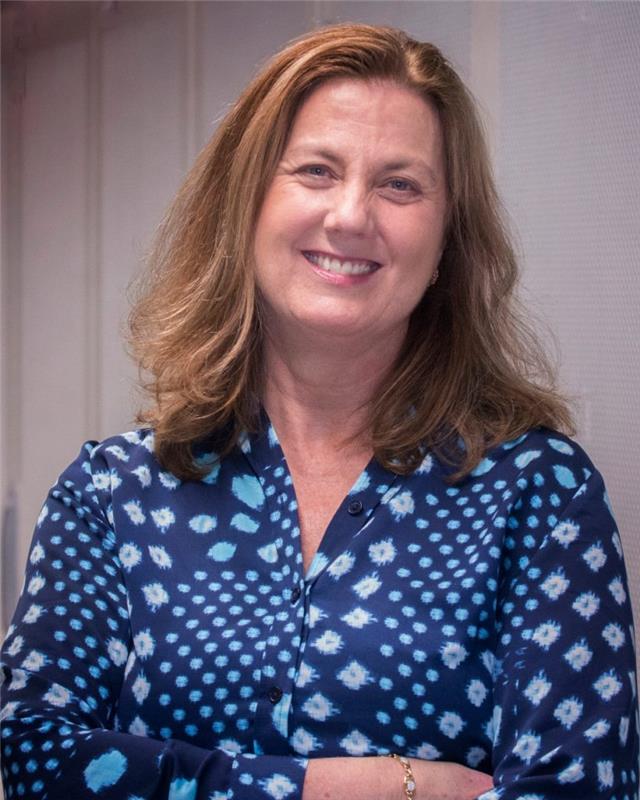
Bundles of fiber called axonal tracts in the brain experience strain when injured. Credit: Kraft Lab.
Reuben Kraft’s research team utilize ICDS resources to better understand traumatic brain injuries
Posted on November 5, 2024Editor’s Note: A version of this article was originally published on Penn State News.
UNIVERSITY PARK, Pa. — According to Reuben Kraft, professor of mechanical engineering at the Penn State College of Engineering, when the human brain experiences an injury, it can be difficult to diagnose a concussion due to the trauma being inside of the skull and can’t be accurately analyzed or assessed.
Kraft, who is a Penn State Institute for Computational and Data Sciences (ICDS) co-hire, and his research team are using ICDS resources to process data and predict injury in the human brain. This particular research has the potential to benefit athletes and military personnel who experience repetitive trauma to the head.
The brain is a heavily networked system of axonal fiber track that transmit information between the regions of the brain. The brain allows for multiple communication pathways, which can act as a detour if one fiber track is ruptured. According to Kraft, even with a ruptured track, the brain can still function, it just may process information slower than usual.
Kraft’s team developed the “Brain Simulation Research Platform,” which is a computational model that allows researchers to assess injury location, predict how the network was affected and how that might impact functional behaviors. The team aims to continue working on the platform and eventually test it clinically.
The researchers collaborated with football players at Western Carolina University to collect data from customized mouthguard sensors. These mouthguard sensors measured the force transmission to the head, captured data from rotational and translational movements as well as monitoring of head motion where there is no direct head impact. The work was funded by The Chuck Noll Foundation.
The football players in this study took a baseline functional test to assess verbal and working memory and reaction time. Players who had sustained a big impact, they were asked to repeat the test to measure any changes in their cognitive function.
A big impact would be considered when the brain tissues was estimated to stretch 20% or more.
“We couldn’t do this work without the right tools,” Kraft said. “The ICDS facilities creates a community of users — faculty, students and staff — who are gaining more information and knowledge and funneling that knowledge into the work. This process really helps us focus on the question of ‘why?’, which makes for more in-depth research and better answers.”
Share
Related Posts
- Professor receives NSF grant to model cell disorder in heart
- Featured Researcher: Nick Tusay
- Multi-institutional team to use AI to evaluate social, behavioral science claims
- NSF invests in cyberinfrastructure institute to harness cosmic data
- Center for Immersive Experiences set to debut, serving researchers and students
- Distant Suns, Distant Worlds
- CyberScience Seminar: Researcher to discuss how AI can help people avoid adverse drug interactions
- AI could offer warnings about serious side effects of drug-drug interactions
- Taking RTKI drugs during radiotherapy may not aid survival, worsens side effects
- Cost-effective cloud research computing options now available for researchers
- Costs of natural disasters are increasing at the high end
- Model helps choose wind farm locations, predicts output
- Virus may jump species through ‘rock-and-roll’ motion with receptors
- Researchers seek to revolutionize catalyst design with machine learning
- Resilient Resumes team places third in Nittany AI Challenge
- ‘AI in Action’: Machine learning may help scientists explore deep sleep
- Clickbait Secrets Exposed! Humans and AI team up to improve clickbait detection
- Focusing computational power for more accurate, efficient weather forecasts
- How many Earth-like planets are around sun-like stars?
- SMH! Brains trained on e-devices may struggle to understand scientific info
- Whole genome sequencing may help officials get a handle on disease outbreaks
- New tool could reduce security analysts’ workloads by automating data triage
- Careful analysis of volcano’s plumbing system may give tips on pending eruptions
- Reducing farm greenhouse gas emissions may plant the seed for a cooler planet
- Using artificial intelligence to detect discrimination
- Four ways scholars say we can cut the chances of nasty satellite data surprises
- Game theory shows why stigmatization may not make sense in modern society
- Older adults can serve communities as engines of everyday innovation
- Pig-Pen effect: Mixing skin oil and ozone can produce a personal pollution cloud
- Researchers find genes that could help create more resilient chickens
- Despite dire predictions, levels of social support remain steady in the U.S.
- For many, friends and family, not doctors, serve as a gateway to opioid misuse
- New algorithm may help people store more pictures, share videos faster
- Head named for Ken and Mary Alice Lindquist Department of Nuclear Engineering
- Scientific evidence boosts action for activists, decreases action for scientists
- People explore options, then selectively represent good options to make difficult decisions
- Map reveals that lynching extended far beyond the deep South
- Gravitational forces in protoplanetary disks push super-Earths close to stars
- Supercomputer cluster donation helps turn high school class into climate science research lab
- Believing machines can out-do people may fuel acceptance of self-driving cars
- People more likely to trust machines than humans with their private info
- IBM donates system to Penn State to advance AI research
- ICS Seed Grants to power projects that use AI, machine learning for common good
- Penn State Berks team advances to MVP Phase of Nittany AI Challenge
- Creepy computers or people partners? Working to make AI that enhances humanity
- Sky is clearing for using AI to probe weather variability
- ‘AI will see you now’: Panel to discuss the AI revolution in health and medicine
- Privacy law scholars must address potential for nasty satellite data surprises
- Researchers take aim at hackers trying to attack high-value AI models
- Girls, economically disadvantaged less likely to get parental urging to study computers
- Seed grants awarded to projects using Twitter data
- Researchers find features that shape mechanical force during protein synthesis
- A peek at living room decor suggests how decorations vary around the world
- Interactive websites may cause antismoking messages to backfire
- Changing how government assesses risk may ease fallout from extreme financial events
- Penn State’s Leadership in AI Research
- Symposium at U.S. Capitol seeks solutions to election security
- Using social media to solve social problems- study funded by ICS seed grant

